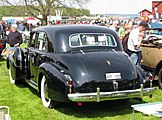Notchback


A notchback is a design of a car with the rearmost section that is distinct from the passenger compartment and where the back of the passenger compartment is at an angle to the top of what is typically the rear baggage compartment.[1] Notchback cars have "a trunk whose lid forms a distinct deck."[2] In profile view, the body has a step down from the roof with a downward inclined passenger compartment's rear window to meet an almost horizontal trunk lid extending to the rear of the car.[citation needed]
The category may be characterized as having a three-box design where the trunk volume is less pronounced than the engine and passenger compartments.
Many models of sedans, coupés, or hatchbacks could be classified as notchbacks. However, the category has limited salience outside of American car manufacturers distinguishing the three-box models from other body styles in the same model range. For example, the Chevrolet Vega range included both a notchback coupe and a fastback coupe.
North America[]
One of the first cars marketed as a notchback is the 1938 Cadillac Sixty Special.[3][4][5]
In 1952, a notchback version of the Nash Ambassador was introduced.[6]
In 1971, Chevrolet marketed the three-box sedan models of the Chevrolet Vega as a notchback to differentiate them from the fastback Vega models.[7][8] For the 1973 model year, the car's name was changed to "Vega Notchback".[9]

1939 Cadillac Series 60 Special
1961 Rambler Ambassador sedan[10]

1971 Chevrolet Vega notchback
English-speaking countries[]
While many car models have notchback characteristics, the category is largely unused outside of North America, with their body style being described using other terms. For example, a three-box sedan[11] is more generally known as a "saloon" in British English.[12] "Notchback" has appeared in a few British English publications, however, it is not a term that is used in common parlance in Britain.[13][14]
See also[]
- Car body style
- Ponton Styling
References[]
- ^ "Notchback definition and meaning". Collins English Dictionary. Retrieved 1 April 2021.
- ^ "Definition of Notchback". Merriam-Webster Dictionary. Retrieved 1 April 2021.
- ^ "1940, The Cadillac Sixty Sets Another Styling Trend". General Motors: Generations of GM Wiki Timeline. Archived from the original on 17 August 2011. Retrieved 7 December 2017.
- ^ "1938-'40 Cadillac Sixty Special". hemmings.com. Retrieved 16 June 2018.
- ^ "Take Me to Your Style Leader: The 1938–1942 Cadillac Sixty Special". ateupwithmotor.com. Retrieved 16 June 2018.
- ^ Gunnell, John (1992). Standard Catalog of American Cars, 1946-1975. Krause Publications. p. 468. ISBN 9780873412049. Retrieved 7 December 2017.
There was new styling for the Ambassador and Statesman. A new notch back body created by Italy's Pininfarina was the fashion hit of the marque's 50th year
- ^ "Chevrolutionary! - 1973 Chevrolet Vega GT Millionth Edition, 1976 Chevrolet Cosworth Vega". hemmings.com. Retrieved 16 June 2018.
- ^ "How the Chevy Vega Nearly Destroyed GM". popularmechanics.com. Retrieved 16 June 2018.
- ^ Chevrolet Vega brochures- years 1971–77. Chevrolet.
- ^ McCourt, Mark J. (December 2014). "1961 Rambler Ambassador V-8 Custom "America's First Compact Luxury Car"". Hemmings Motor News. Retrieved 1 April 2021.
1961 Ambassador's reverse-slant C-pillar
- ^ "sedan". Chambers 21st Century Dictionary. Retrieved 18 April 2017.
- ^ "saloon". Chambers 21st Century Dictionary. Retrieved 18 April 2017.
- ^ Stevenson, Angus; Waite, Maurice, eds. (2011). "notchback". Concise Oxford English Dictionary (Luxury ed.). Oxford University Press. p. 978. ISBN 9780199601110.
a car with a back that extends approximately horizontally from the bottom of the rear window so as to make a distinct angle with it.
- ^ Barnard, R.H. (1996). Road Vehicle Aerodynamic Design. Longman. ISBN 9780582245228.
- Automotive styling features


